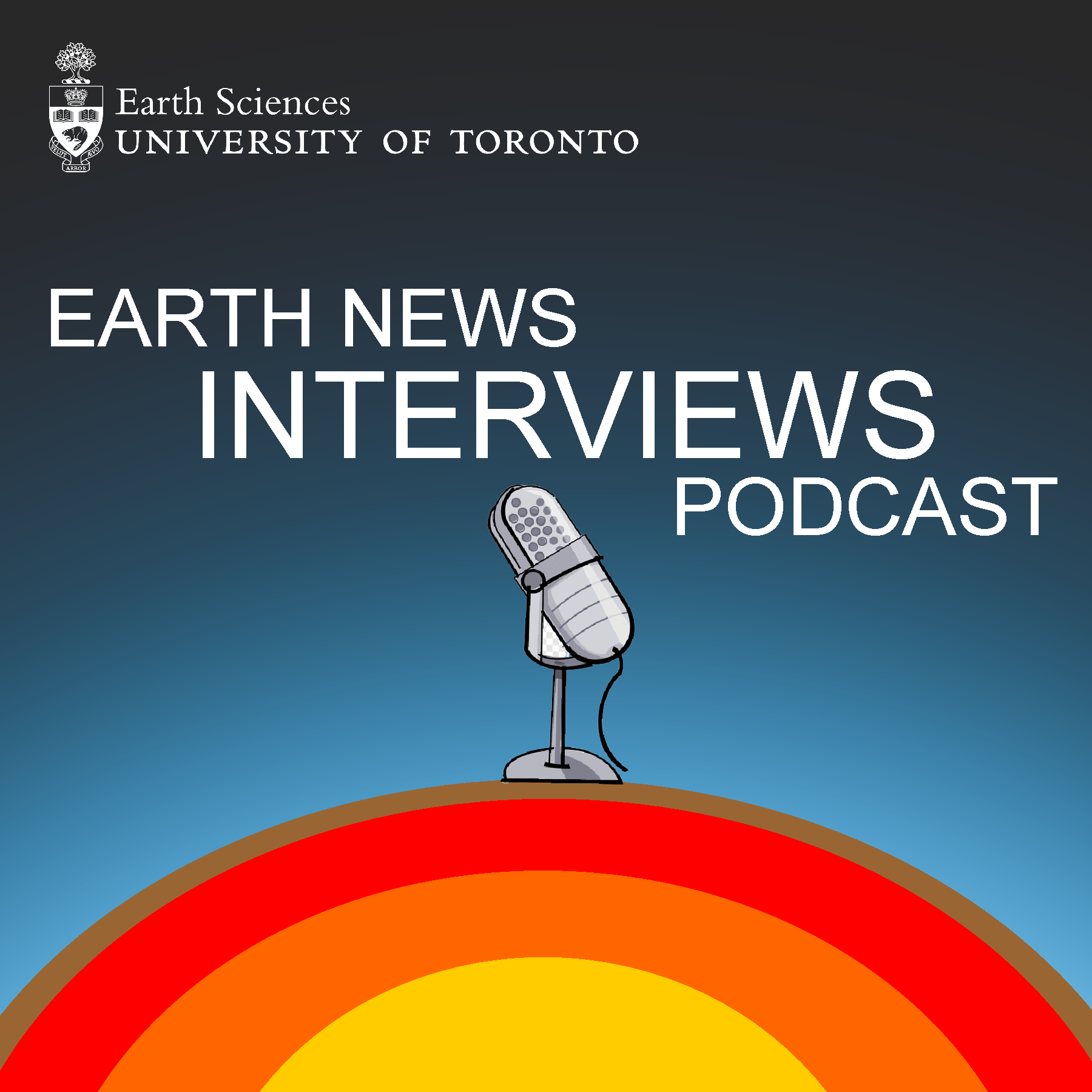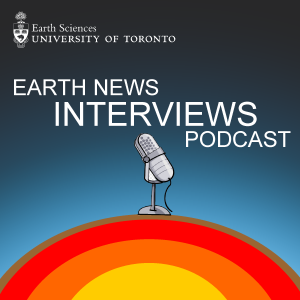
3.7K
Downloads
27
Episodes
We’re back for an all-new season with a new team! Our hosts sit down with an earth scientist and discuss the most recent developments in their field and how these discoveries impact all of us. This podcast is supported by the Department of Earth Sciences at the University of Toronto.
Episodes

Monday Apr 11, 2022
The Subduction Pulley with Erkan Gun and Russ Pysklywec
Monday Apr 11, 2022
Monday Apr 11, 2022
In this episode of Earth News Interviews, we speak with grad student Erkan Gun and professor Russ Pysklywec about the mechanisms that drive continental movements!
Note: This interview was recorded back June 2021.
Primary source discussed:
Pre-collisional extension of microcontinental terranes by a subduction pulley

Tuesday Mar 08, 2022
DEI in the Earth Sciences
Tuesday Mar 08, 2022
Tuesday Mar 08, 2022
Happy International Women's Day!
In this special episode of ENI, we have a roundtable style discussion on the topic of Diversity, Equity, and Inclusion (DEI) in the Earth Sciences. Joining Kathryn in this episode, we have Assistant Professor Tasca Santimano and PhD students Sophia Zamaria and David Aceituno-Caicedo.
Primary readings discussed:
- Gender representation cues labels of hard and soft sciences

Monday Feb 28, 2022
Geophysical Techniques and Mineral Exploration with Andrei Swidinsky
Monday Feb 28, 2022
Monday Feb 28, 2022
In this episode of ENI, we talk to the University of Toronto's new assistant professor, Andrei Swidinski about how mineral exploration is done using geophysics - magnetotellurics and passive seismic!
Primary readings discussed:

Monday Feb 07, 2022
New Years Episode 2022
Monday Feb 07, 2022
Monday Feb 07, 2022
Welcome back to a new year of Earth News Interviews!
In this episode, Dean, Winnie, Kathryn, and Tina each discuss their favorite earth sciences paper from 2021.
Primary reading discussed:
- Using phylogenies to detect a major extinction event in the Oligocene of Africa
- Clues from soured milk reveal how gold veins form
- Accidental synthesis of a previously unknown quasicrystal in the first atomic bomb test

Tuesday Sep 28, 2021
Protoplanetary Disks and Backward Spinning Stars with J. J. Zanazzi
Tuesday Sep 28, 2021
Tuesday Sep 28, 2021
We typically expect physical phenomena to follow certain rules: an apple falls from a tree under the influence of gravity, a skater will eventually slow down from the friction between their skates and the ice, a star spins in a similar direction as the planets in its solar system... Here's the interesting bit, the last one doesn't always hold true. In fact, astrophysicists theorized that there are solar systems in outer space that don't follow this rule. And in 2019, scientists measured this counterintuitive phenomenon in a solar system almost 900 light-years away called K2-290. Their findings were published earlier this year and we got a chance to interview one of the co-authors of this paper, Dr J. J Zanazzi from the Canadian Institute for Theoretical Astrophysics at the University of Toronto covering topics like the formation of protoplanetary disks, the effect of neighbouring stars and what we know about planet formation.
Primary readings discussed:

Sunday Aug 29, 2021
Canada's Nuclear Waste Management Plan with Andrew Parmenter
Sunday Aug 29, 2021
Sunday Aug 29, 2021
In this episode, we interview Andrew Parmenter, a geologist working for the Nuclear Waste Management Organization (NWMO), a not-for-profit organization tasked with the safe, long-term storage of Canada’s used nuclear fuel in a manner that protects people and the environment for generations to come. Nuclear waste is a reality our generation has been tasked with storing in a safe way after being passed on from previous generations. We touch upon the key features of long-term nuclear waste repositories, building strong relationships with local Indigenous communities, and what the role of a geologist is in a project of this scale and importance.

Sunday Mar 14, 2021
The History of Earth Sciences Education with Erik Klemetti
Sunday Mar 14, 2021
Sunday Mar 14, 2021
Many Earth Sciences Departments have been recording low enrollment numbers for the last decade. This field has been known to ride the industry wave; high enrollment when the oil, petroleum, and mineral resource industry is booming, low when it's not. This time, the ebb and flow of markets aren't the cause. General public mistrust of the industry, lack of diversity, and reliance on courses that no longer seem to fit with modern problems are just a few reasons Assistant Professor Erik Klemetti, a volcanologist and science communicator at Denison University cites in his Discover Magazine article on Geoscience Education. We interview him about how the field of Earth Sciences has changed since the Bronze Age and how important it will be for preventing current and potential future environmental catastrophes.
Primary readings discussed:
https://www.discovermagazine.com/planet-earth/geology-is-at-a-crossroads

Sunday Feb 28, 2021
Compositions of Exoplanets and their Stars with Diana Valencia
Sunday Feb 28, 2021
Sunday Feb 28, 2021
The first exoplanet was discovered in 1992 by Aleksander Wolszczan and Dale Frail. Less than 30 years after this initial discovery that won the Nobel Prize in Physics, more than 4000 exoplanets have been confirmed (NASA). These planets, while unique, have some similarities in mass and size, and potentially other features, to Earth. While we aren't able to take a sample from the surface of these planets, that doesn't mean we're limited to simply guessing at their composition. Associate Professor of Physics and Astrophysics at the University of Toronto Scarborough, Dr. Diana Valencia walks us through how we can infer the composition of rocky planets without actually having sampled the planet's surface. This research is laying the groundwork for more in-depth studies on processes that have shaped exoplanets, how they may be similar to Earth's, and whether similar planetary evolution implies finding extraterrestrial life.
Primary readings discussed:
https://academic.oup.com/mnras/article-abstract/499/1/932/5899063

Sunday Feb 14, 2021
Flood Risks and Hazards with Joseph Desloges
Sunday Feb 14, 2021
Sunday Feb 14, 2021
With natural disasters become more frequent and damaging, how can we accurately access who's at risk without updated information and predictions? The answer is we can't. That's why accurate risk and hazard mapping is essential for both private homeowners and all levels of government that have a public responsibility to mitigate the adverse after-effects of disasters. In this episode we talk to Professor Joseph Desloges of the Geography and Planning Department at the University of Toronto. He specializes in the influence of rivers, glaciers and humans on landform development, and has a particular interest in flood risk mapping. We discuss topics like accurate risk assessment, geoengineering solutions to floods, and what have been the key human-driven changes that have left our cities exposed to flood-related damages.
Primary reading discussed:
https://www.sciencenews.org/article/how-to-protect-your-home-from-disasters-climate-change

Sunday Jan 31, 2021
The Life and Legend of the Ediacaran Biota with Marc Laflamme
Sunday Jan 31, 2021
Sunday Jan 31, 2021
Imagine if you lived in a world where some humans evolved the ability to fly, use one hundred percent of their brainpower, or the ability to reproduce at twice the normal rate. These evolved humans would certainly have an evolutionary advantage over the rest of us, and likely outcompete us in the long-term. What if a similar situation happened around 541 million years ago? Around this time, in the late Neoproterozoic, the Ediacaran biota, mostly filter-feeding and immobile organisms, faced the threat of extinction from their more agile, burrowing, and mobile competitors that evolved during the late Ediacaran and early Cambrian. A mass extinction ensued, but the definite causes are still being debated. We talk to Associate Professor Marc Laflamme, an expert on Paleoclimate and Paleontology about this fascinating time period.
Primary Sources Discussed:
https://www.sciencedirect.com/science/article/pii/S0012825220304815
